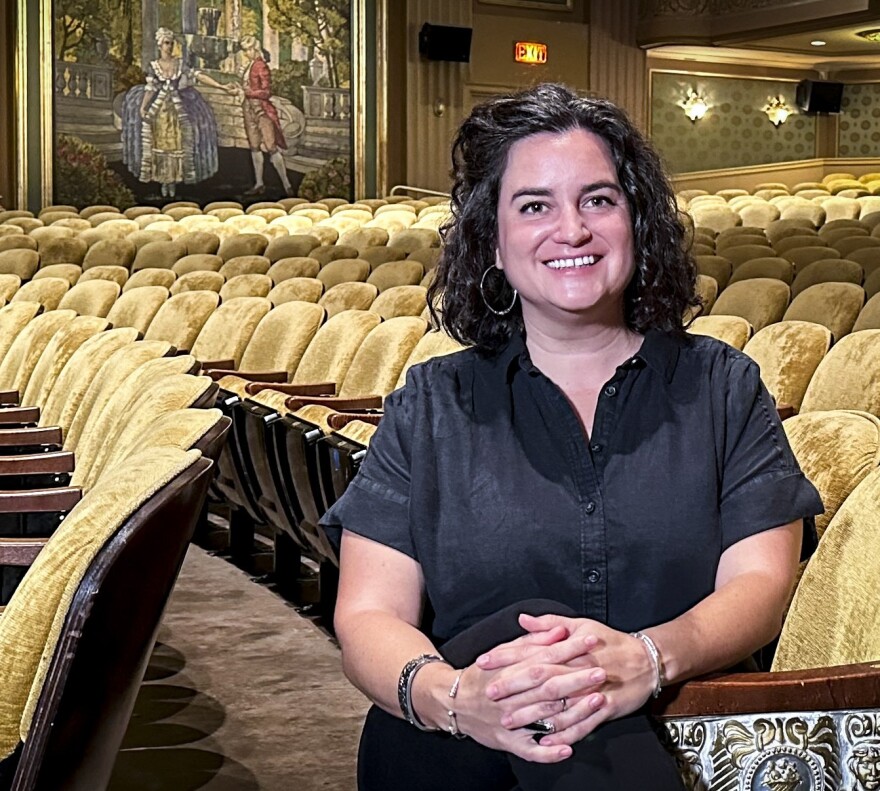American museums, libraries and cultural organizations could soon look very different. Some may perish.
Earlier this month, the National Endowment for the Humanities revoked grant funding and placed most of its employees on leave. Cuts also announced for the federal Institute of Museums and Library Services have left stewards of Virginia’s theaters, libraries, museums, cultural organizations and other groups fearing what could wind up unsupported.
“We stand to lose access to the multitude of voices past and present that make Virginia what it is today,” said Katy Clune, the state’s chief folklorist with Virginia Humanities.
Established 50 years ago, Virginia Humanities gets about 20% of its annual revenue from Washington. At an awards gala this month, Executive Director Matthew Gibson said he expects to cut some staff and programs to keep the organization alive.

“Our commitment to Virginians is that we’ll be here for them, because we’re needed now more than ever,” Gibson told VPM News. “We are an economic catalyst for the commonwealth and for the cultural economy. I know there’s a lot of concern about this being wasteful and inefficient, but we’re efficient and certainly not wasteful.”
The funding and staffing cuts are part of President Donald Trump’s ongoing efforts to reshape the federal government through the Department of Government Efficiency. An executive order signed last month specifically calls for shrinking the IMLS and six other agencies — including the U.S. Interagency Council on Homelessness and the Minority Business Development Agency — to “the maximum extent” possible.
In addition to eliminating expenses, the White House and its allies have targeted spending on initiatives related to diversity, equity and inclusion.
Earlier this month, the IMLS outlined some of the moves on social media. The caption for the post — highlighting money spent on programs related to LGBTQ people, social justice studies and research on “systemic racism in museums” — said “the era of using your taxpayer dollars to fund DEI grants is OVER.”
With the federal grants vanishing, the Library of Virginia also expects changes. Dennis Clark, the Librarian of Virginia, said the state library gets about $4.3 million — or about 16% of its annual budget — from the IMLS.
Beyond funding for library staff and efforts to preserve historic documents, money and resources for smaller library branches throughout the commonwealth, including public school libraries, may also disappear.
“If there was just one thing I am worried about, it would be that disconnect with our public libraries,” Clark said. “We’re going to see branches close. We’re going to see books not being bought. We’re going to see programs that are important and related to literacy fade without that funding.”
Funding for Jackson Ward project, teen literacy and cultural festivals gutted
In the last six months, Virginia Humanities has announced around half a million dollars in grant awards and sponsorships for about 50 different organizations and projects.
Podium RVA, a literary arts group that manages free after-school writing and communications workshops and programs for adolescents in the Richmond and Tri-Cities areas, received $10,000 in NEH funding this year.
Executive Director Vicki Yeroian said she’s nervous about losing the money. The amount is about equal to the annual cost of programs at one of the dozens of schools it serves. She said the timing of the cuts are especially unconscionable, as teenagers are struggling to develop writing and communication skills after the COVID-19 pandemic disrupted critical stages of their early education.
“We can see there’s been significant literary learning loss,” she said, adding that many of the students Podium serves are just a couple years from applying to college or trying to enter the professional workforce. “Fundamental building blocks are gone.” Some of the other NEH grant awards include:
- $20,000 for a Library of Virginia exhibit about the “hidden history” of Richmond's Jackson Ward
- $20,000 for an African American history exhibit at the Fredericksburg Area Museum and Cultural Center
- $5,000 for two regional “We The People” high school civics competitions in Orange County
- $5,000 for expanded programming at the annual Monacan Indian Nation Powwow in Amherst County
- $2,000 to sponsor the “I See Me Play in RVA!” event at the Children’s Museum of Richmond
Last week, the Library of Virginia announced that the NEH terminated three of its current grants. One of them was also for the Jackson Ward exhibit and a partnership with the JXN Project, a community nonprofit dedicated to memorializing the neighborhood’s cultural legacy as the nation’s first historically registered Black urban neighborhood.
The other two NEH grants supported a two-year effort to digitize more than 100,000 pages of historical newspapers from 1860 to 1963 and a three-year project digitizing 250,000 separation notices for WWII-era Virginia service members.
Clark said the library also received word that an IMLS grant supporting the preservation of 18th century legislative petitions was also being cut. He said all those efforts help save historical records that connect us to the state’s forebears and the issues of their day.
“These things are fragile, and we have to do work to make sure they’re available 200 years in the future through conservation of the physical item or digitization,” he said. “All of these grants are about making sure that we can reflect on Virginia’s history and continue to learn from where we’ve been.”
Teresa Pollak, a member of the Monacan Indian Nation, said the cuts won’t impact its upcoming powwow in May. Still, she said the scope of Trump’s budget reductions are “unsettling,” describing uncertainty about funding for housing, food and agricultural programs.
“It’s death by a thousand paper cuts,” she said.
Speaking about funding for the humanities, Pollak said those cuts target educational and cultural programs that help develop empathy and understanding, especially among adolescents.
“What kind of adults are they going to be? I’m just very concerned,” she said. “What are we going to be leaving our kids? It’s kind of scary to me.”


